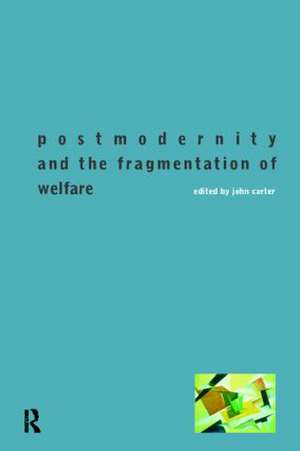Postmodernity and the Fragmentation of Welfare
Editat de John Carteren Limba Engleză Paperback – 19 mar 1998
Already disorientated by globalisation, new technologies and the years of new right ascendancy, welfare faces a significant challenge in the postmodern. It suggests that, rather than universality and state provision, the new social policy will be consumerised and fragmented -a welfare state of ambivalence.
With contributions from authors coming from a variety of fields offering very different perspectives on postmodernity and welfare Postmodernity and the Fragmentation of Welfare also keeps social policy's intellectual inheritance in view. By exploring ways in which theorisations of postmodernity might improve understanding of welfare issues in the 1990s and assessing the relevance of theories of diversity and difference to mainstream and critical social policy traditions, this book will be and essential text for all students of social policy, social administration, social work and sociology.
| Toate formatele și edițiile | Preț | Express |
|---|---|---|
| Paperback (1) | 472.10 lei 6-8 săpt. | |
| Taylor & Francis – 19 mar 1998 | 472.10 lei 6-8 săpt. | |
| Hardback (1) | 1330.94 lei 6-8 săpt. | |
| Taylor & Francis – 19 mar 1998 | 1330.94 lei 6-8 săpt. |
Preț: 472.10 lei
Preț vechi: 555.41 lei
-15% Nou
Puncte Express: 708
Preț estimativ în valută:
90.34€ • 94.99$ • 74.64£
90.34€ • 94.99$ • 74.64£
Carte tipărită la comandă
Livrare economică 16-30 aprilie
Preluare comenzi: 021 569.72.76
Specificații
ISBN-13: 9780415163927
ISBN-10: 0415163927
Pagini: 304
Dimensiuni: 152 x 229 x 24 mm
Greutate: 0.45 kg
Ediția:New.
Editura: Taylor & Francis
Colecția Routledge
Locul publicării:Oxford, United Kingdom
ISBN-10: 0415163927
Pagini: 304
Dimensiuni: 152 x 229 x 24 mm
Greutate: 0.45 kg
Ediția:New.
Editura: Taylor & Francis
Colecția Routledge
Locul publicării:Oxford, United Kingdom
Public țintă
Postgraduate and UndergraduateNotă biografică
John Carter is a Senior Lecturer in the School of Social Sciences, University of Teesside.
Cuprins
Contents. 1. Preludes, introductions and meanings John Carter Part 1 Postmodern frameworks and social policy 2. Studying social policy after modernity John Carter 3. Postmodernism, poststructuralism ans social policy John R. Gibbs 4. Oppositional postmodern theory and welfare analysis: anti-oppressive practice in a postmodern frame Martin O'Brien and Sue Penna 5. Quality assurance and evaluation in social work in a postmodern era Barbara Fawcett and Brid Featherstone Part 2 Critical social policy and postmodernity 6. 'One step beyond': critical social policy in a 'postmodern' Britain? Kirk Mann 7. Postmodernity and the future of welfare: whose critiques, whose social policy? Suzy Croft and Peter Beresford Part 3 Social divisions and social exclusion 8. New horizons? New insights?: Postmodernising social policy and the case of sexuality Jean Carabine 9. Reopening the gift: race and the critique of normative social policy Chris Smaje 10. Individualisation processes and social policy: insecurity, reflexivity and risk in the restructuring of contemporary British health and housing policies Sarah Nettleton and Roger Burrows Part 4 Governance and new technologies of control in the new social policy 11. Thriving on chaos? Managerialisation and social welfare John Clarke 12. Performativity and fragmentation in 'postmodern schooling' Stephen J. Ball 13. Post-Betty Fordism and neo-liberal drug policies Robin Bunton 14. Welfare direct: informatics and the emergence of self-service welfare? Brian D. Loader Part 5 Citizenship amid the fragmented nation state 15. The delivery of welfare: the associationist vision Paul Hoggett and Simon Thompson 16. Globalisation, fragmentation and local welfare citizenship Allan Cochrane 17. Postmodernity and social Europe Norman Ginsburg References. Name Index. Subject index.
Descriere
This collection analyzes the potential challenge to the welfare state from postmodern ideas. Contributors explore the relevance of theories of diversity and difference to mainstream and critical social policy.
























